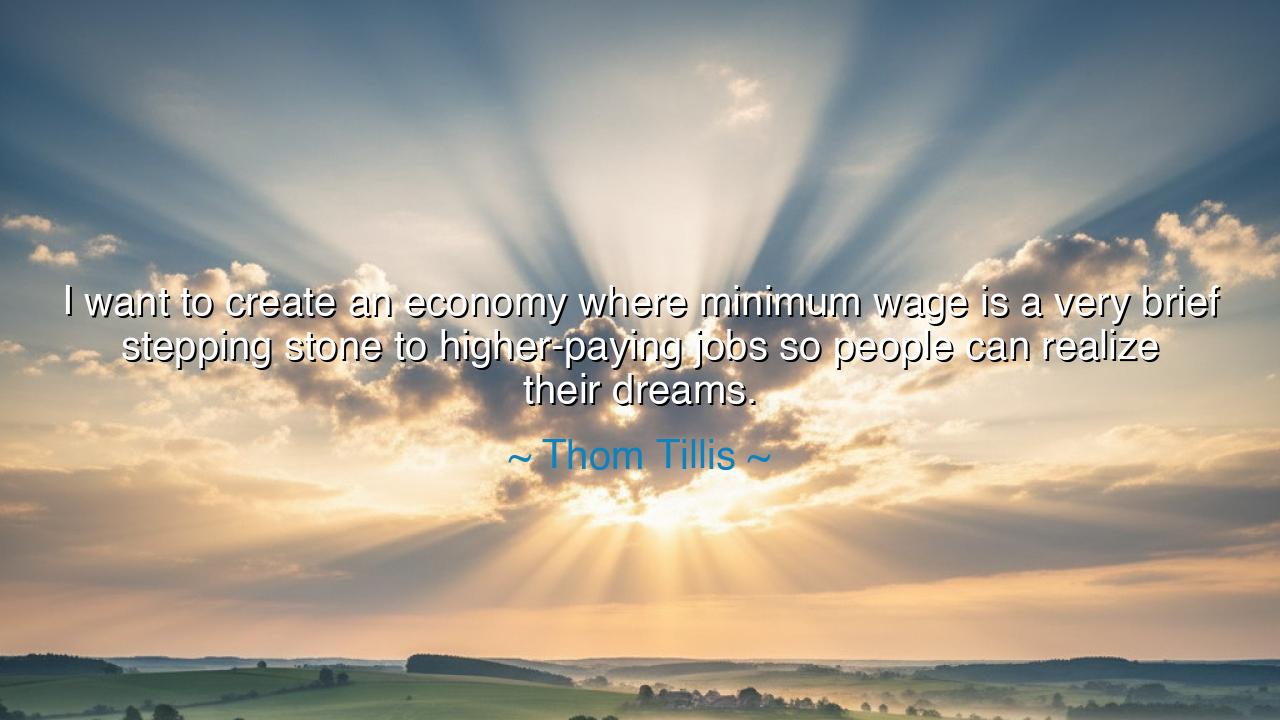
I want to create an economy where minimum wage is a very brief
I want to create an economy where minimum wage is a very brief stepping stone to higher-paying jobs so people can realize their dreams.






“I want to create an economy where minimum wage is a very brief stepping stone to higher-paying jobs so people can realize their dreams.” Thus spoke Thom Tillis, a man who gazed upon the machinery of commerce and sought not merely its motion, but its purpose — the flourishing of the human spirit. His words rise beyond policy and numbers, reaching instead toward a moral vision: that work should not be a shackle, but a pathway, and that every person, no matter their beginning, should be able to climb toward the summit of dignity and fulfillment.
In this statement, Tillis reveals a faith in the transformative power of opportunity. The minimum wage, that base measure of survival, he calls a “stepping stone” — not a prison, not a permanent fate, but a foundation from which to ascend. He envisions an economy alive with movement, where ambition and labor are rewarded, where each person’s potential may unfold like a flower in the light of freedom. Yet this vision is not merely of money or markets; it is of the human soul striving upward, of the innate longing in every heart to realize one’s dreams.
The ancients, too, spoke of such ascent. The philosopher Aristotle taught that work without purpose enslaves, but work aligned with virtue ennobles. A society that allows its citizens only to toil without hope commits a quiet cruelty, for it denies them the chance to grow beyond necessity. Tillis’s words echo this wisdom — the belief that the economy exists for man, not man for the economy. To create a world where the lowest rung leads surely to the higher, where each worker may glimpse a brighter horizon, is not merely an economic goal — it is a moral calling.
Consider the story of Andrew Carnegie, born poor in Scotland, who came to America with nothing but a will to labor. He began as a factory boy earning a few dollars a week, yet through perseverance, curiosity, and courage, he rose to become one of the richest men of his age. More importantly, he spent his fortune building libraries and universities — stepping stones for others to rise as he did. His life became a living parable of Tillis’s dream: that poverty need not define destiny, that the ladder of labor can lead to the heights of self-fulfillment when society allows the climb.
Yet Tillis’s vision carries a deeper challenge, one that calls not only to leaders, but to all who live within the circle of civilization. For it is not enough to create jobs; one must create pathways. The stepping stone is meaningless if it leads nowhere. A society that traps its people in low wages and stagnant futures betrays both the worker and the dream. But a society that invests in education, innovation, and skill — that nourishes ambition rather than punishes it — becomes the fertile soil from which prosperity grows. Thus, his words are both a promise and a warning: the promise of a just order, and the warning that without upward motion, freedom itself withers.
It is also a lesson in human dignity. For the dream Tillis speaks of is not only the dream of wealth, but of self-worth — the pride of standing upon one’s own work, the joy of progress, the quiet confidence that tomorrow can be better than today. This is what gives meaning to labor and breathes nobility into the humblest task. When a man or woman can see that each hour of effort carries them closer to their vision, they are no longer merely surviving — they are living, creating, and contributing to the beauty of the world.
Therefore, O listener, take this teaching into your own heart: see your work as a stepping stone, not a cage. Whatever your labor, let it be the beginning, not the end. Learn, strive, and grow until your dreams take form before your eyes. And as you rise, help others rise with you — for the truest wealth is not found in gold, but in the lifting of souls. If each of us becomes a builder of stepping stones for others, then together we create not only a stronger economy, but a greater humanity.
In the end, the wisdom of Thom Tillis’s words is clear: that a nation’s greatness is not measured by its riches, but by its capacity to turn work into purpose and opportunity into hope. Let every heart remember this — that no beginning is too small, no dream too distant, and no wage too low to be the first stone upon the path to a higher destiny. For when all men and women are free to climb, then the world itself ascends with them.






AAdministratorAdministrator
Welcome, honored guests. Please leave a comment, we will respond soon